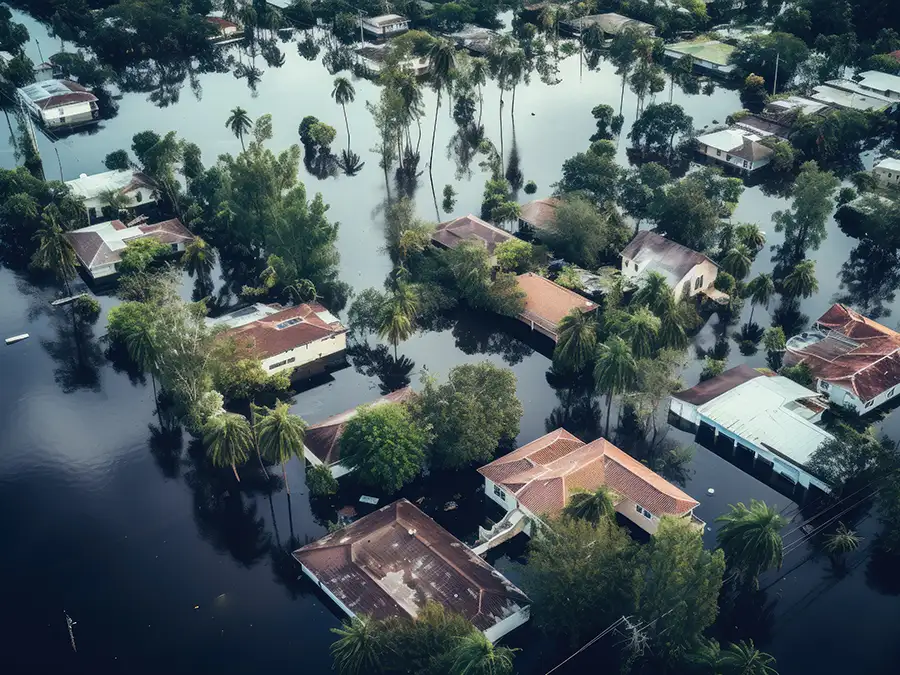In theory, the purpose of insurance companies is to provide financial support and coverage for people when they need it most (i.e., after suffering some kind of loss). Unfortunately, the reality is that many insurance companies fail to stand by their promises in those times of need.
Imagine this scenario: You’ve been paying insurance premiums for a homeowner’s insurance policy for years or even decades, but when you finally make a claim after a hurricane or other covered loss, the insurance company doesn’t want to pay, and you’re stuck footing the bill for massive home repairs.
Insurance companies often look for any reason to deny a claim, which is why having an experienced Miami insurance dispute lawyer on your side can help tip the balance in your favor.
Have questions about how much your homeowners insurance claim is worth?
Redondo Law has the answers you’re looking for.
Has your insurance company breached their contract by wrongfully denying your claim?
When an insurance company improperly denies your claim, they have breached their promise to you, their policyholder. A few very common examples of insurance company breaches include:
- Failing to conduct a fair and timely investigation into a claim
- Unreasonably delaying the payment of benefits
- Unreasonably refusing to settle a claim within an insurance policy’s limits
- Misrepresenting the terms or provisions of the insurance policy to the policyholder
- Failing to communicate crucial information or updates about the claim status in a timely manner
- Making arbitrary demands for excessive or unnecessary documentation as a condition for processing or paying a claim
- Failing to provide contracted-for coverage
- Implementing significant changes to the policy terms or coverage without proper notification or consent from the policyholder
- Offering significantly less money to settle a claim than what is reasonably owed based on the policy’s coverage
- Employing tactics that pressure the policyholder into accepting a lower settlement than deserved
- Ignoring or inadequately addressing the policyholder’s inquiries or complaints regarding the claim process
- Denying a valid claim without a reasonable explanation
If your insurance company is engaging in any of these behaviors, they may be in breach of their obligations to you under the terms of your insurance policy and Florida law. Always consult an experienced insurance dispute adjuster if you have questions about your policy before accepting a settlement offer from the insurance company.
How should I handle my water damage claim?
Learn the steps to take to file a claim if your home sustains water damage in Miami.
How the homeowner insurance claim process is supposed to work
The law requires that insurance companies operate in “good faith,” which means they must analyze and handle claims in an honest and fair manner.
As a homeowner, it’s crucial to understand the various steps and responsibilities involved in the claims process to ensure you get the compensation you’re entitled to under your policy. They include:
- Filing the claim. When a policyholder experiences a loss covered under their homeowner’s insurance, such as property damage or theft, they must initiate the process by filing a claim with their insurance company. This claim should include all relevant details and documentation of the loss.
- Claim acknowledgment and review. The insurance company acknowledges receipt of the claim and begins its review. They are obligated to assess the claim promptly and accurately.
- Inspection and assessment. The insurer sends a claims adjuster to inspect the damage and assess the extent of the loss. This assessment is critical as it forms the basis of the insurance company’s decision on the claim. Be aware that the adjuster will look for any reason on the policyholder’s part that would justify denying the claim.
- Adjuster’s report and claim decision. After the investigation, the adjuster prepares a report detailing the findings. Based on this report, the insurance company will make a decision on whether the claim is valid and the amount to be paid out.
- Settlement offer and negotiation. If the claim is approved, the insurance company makes a settlement offer to the policyholder. This offer should be in line with the policy’s terms and the assessed damage. In the event that the policy only partially covers the incident, the adjuster may offer a partial payment to satisfy the claim. If the policyholder believes the offer is insufficient, they can negotiate with the insurer for a higher settlement.
- Dispute and legal action. In cases where there is a significant disagreement between the policyholder and the insurer over the claim value or coverage, or if the insurer acts in bad faith and wrongfully denies the claim, the policyholder may need to seek legal representation. An experienced insurance dispute attorney can negotiate with the insurer on behalf of the policyholder or, if necessary, pursue legal action to ensure fair compensation is received.
If you believe you’re encountering unfair practices from your insurance company, seek help from a personal injury attorney experienced in insurance disputes to learn more about your rights.
What homeowners should do after a hurricane
Learn the crucial steps to take after a hurricane or major storm for a successful insurance claim.
FAQs
How long does homeowners insurance have to settle a claim in Florida?
As of 2023, homeowners insurance companies have up to 60 days after receiving notice of an initial, reopened or supplemental property insurance claim to either pay or deny the claim, unless external factors beyond their control prevent them from doing so, according to Florida Statute 627.70131.
During this period, insurers are required to provide a written explanation to the policyholder if they decide to pay a lesser amount than what’s specified in the loss estimate or if they deny or partially deny the claim. This explanation must detail the reasons based on the insurance policy and relevant facts or laws.
If the insurance company makes a payment on the claim after the 60-day deadline (or after any extended period granted due to uncontrollable factors), the payment will accrue interest from the date the claim was initially received.
What voids homeowners insurance?
Homeowners insurance can be voided for several reasons, often related to a policyholder’s actions or omissions. The most common causes include:
- Misrepresentation or fraud. Providing false information or failing to disclose important facts about the property can result in your policy being voided.
- Unoccupied property. If a home is unoccupied for an extended period, typically over 30 days, without notifying the insurer, coverage may be voided.
- Illegal activities. Using the property for illegal purposes or committing criminal acts on the premises can also invalidate a policy.
- Non-payment of premiums. Failing to pay insurance premiums on time will typically result in a canceled policy.
- Lack of maintenance. Neglecting essential maintenance can result in a voided policy if it leads to damage that should have been prevented.
- Major changes or renovations. Making significant alterations to the property without informing the insurer can also sometimes lead to an invalid policy.
It’s crucial to adhere to policy terms and keep the insurer informed of significant changes to prevent your policy from inadvertently being canceled or voided.
What should I not say to a home insurance adjuster?
When speaking with a home insurance adjuster, there are certain things you should avoid saying, as they could negatively impact your claim. Below are some examples:
- Admitting fault. Do not admit any fault for the damage. For instance, avoid saying, “I forgot to turn off the water.”
- Speculating about the cost of repairs. Avoid making statements about repair costs if you’re not certain. For example, don’t say, “I don’t think it will be too expensive to fix.”
- Downplaying the damage. Be careful not to downplay the extent of the damage. Avoid saying things like, “It’s not that bad” or “I can probably fix it myself.”
- Accepting the first settlement offer immediately. Be wary of accepting the first offer without consideration. Avoid saying, “That amount should be more than enough,” without assessing if it fully covers your losses.
- Agreeing to a recorded statement without preparation. Be cautious about providing a recorded statement. If you’re asked if it’s okay to record your conversation, it’s always best to say “no.”
Always remember that your conversations with an insurance adjuster can significantly impact your claim. If you’re unsure about how to navigate these discussions, consider consulting with a lawyer who specializes in insurance claims.
Get help from an experienced Miami insurance dispute attorney
If you’ve suffered a loss related to water damage, fire damage or any other type of damage to your home and are considering filing an insurance claim or have already filed a claim and are being treated unfairly by your insurer, contact Miami insurance dispute attorney Mike Redondo at Redondo Law.
Mike spent the early years of his career working for insurance companies, so he understands the tactics they use to minimize or deny claims. Now, he uses that knowledge to help Miami homeowners get maximum compensation after unexpected home damage.
Don’t settle for less than you deserve. Schedule a free consultation with Redondo Law today by filling out the form below.
References
Statutes & Constitution :View Statutes : Online Sunshine. (n.d.). Www.leg.state.fl.us. Retrieved November 29, 2023, from http://www.leg.state.fl.us/statutes/index.cfm?App_mode=Display_Statute&URL=0600-0699/0627/Sections/0627.70131.html#1



